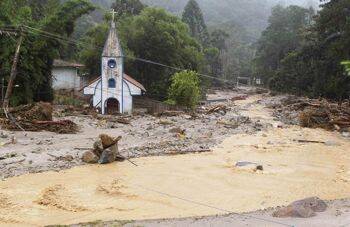Brazil's bishops launched a campaign to aid victims of severe flooding that has left more than 500 people dead. Record rainfall in southeastern Brazil caused rivers to overflow their banks and triggered landslides that buried houses. News posted on the website of Caritas Brazil, the bishops' aid and development agency, told of rescuers trying to help people who were trapped, as bodies swept by in the river. The flooding has affected more than 1 million people in the states of Rio de Janeiro, Sao Paulo, Espirito Santo and Minas Gerais. Churches opened their doors to shelter people left homeless by the flooding and receive the bodies of victims. In the Diocese of Petropolis, where two cities, Teresopolis and Itaipava, were especially hard hit, Bishop Filippo Santoro expressed the church's "solidarity with the victims, those left without shelter or protection," and said he was "making parish buildings available to aid the victims." In a statement issued Jan. 13, the Brazilian bishops said: "We are deeply saddened by the growing death toll and the victims who lost their loved ones and watched as their homes and possessions were destroyed. ... We express our solidarity with the victims and call on Brazilian society to increase its donations to alleviate the pain and revive the hope of overcoming such an enormous tragedy." Caritas officials said they were using donations initially to provide drinking water, hygiene materials, mattresses, blankets, food and medicine to victims. The bishops called for a special nationwide collection Jan. 30.
New Campaign for Flood Victims
Show Comments (
)
Comments are automatically closed two weeks after an article's initial publication. See our comments policy for more.
The latest from america
Trauma-informed spirituality knows better than to promise that prayer will take away all the pain. But it can offer the hope that, even in the midst of pain, there can be moments of feeling whole.
Israeli Prime Minister Benjamin Netanyahu telephoned Pope Leo XIV, who urged Israel’s leader to revive negotiations and enact a ceasefire.
Msgr. Carlo Alberto Capella, a former Vatican diplomat who was convicted of distributing and possessing child pornography, was reinstated at the Vatican, a Spanish report says.
After an early morning attack on the Holy Family Church in Gaza, Pope Leo XIV called for an immediate ceasefire, dialogue and peace in the region.








